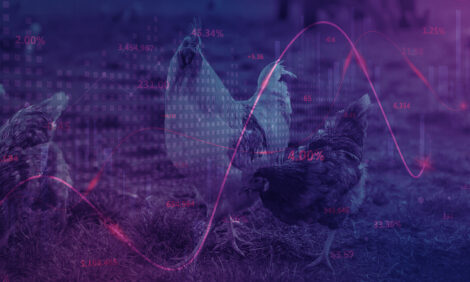



Improving Performance of Broilers Fed Lower Digestible Protein Diets
The search for alternative protein sources in feedstuffs, is a field of research that is gaining considerable attention. For example, soy bean meal (SBM) and fish meal are easily digestible and have traditionally been the main sources of proteins in poultry diets.However, this is likely going to change in the future.
 The search for alternative protein sources in feedstuffs, is a field of research that is gaining considerable attention. For example, soy bean meal (SBM) and fish meal are easily digestible and have traditionally been the main sources of proteins in poultry diets. However, this is likely going to change in the future. The world population is growing and the demand for animal products is increasing, but at the same time, prices for these protein meals are volatile. Moreover, their accessibility is expected to decline with an increasing demand for more highly digestible diet ingredients to be used for human consumption rather than for inclusion in animal diets.
The search for alternative protein sources in feedstuffs, is a field of research that is gaining considerable attention. For example, soy bean meal (SBM) and fish meal are easily digestible and have traditionally been the main sources of proteins in poultry diets. However, this is likely going to change in the future. The world population is growing and the demand for animal products is increasing, but at the same time, prices for these protein meals are volatile. Moreover, their accessibility is expected to decline with an increasing demand for more highly digestible diet ingredients to be used for human consumption rather than for inclusion in animal diets.
The drive to continuously improve poultry production in a way that is both profitable and sustainable, will therefore fuel the evaluation of other protein sources that are more economical. However, these alternatives are likely to be less digestible, which will have a negative impact on animal performance. Not only will their lower digestibility result in reduced ileal uptake of amino acids, but also in more proteins reaching the hindgut. There, they will be used as a substrate for proteolytic fermentation, which can result in the production of harmful compounds that will compromise intestinal integrity and function.
To explore the effects of less digestible protein sources on broiler production and to evaluate the potential of different feeding strategies to mitigate their negative impact on performance, several studies were set up at Wageningen University (Dr. R.P. Kwakkel, the Netherlands). In one particular study, which has recently been published in Poultry Science, an experiment was set up in which birds were fed a poorly digestible diet based on rapeseed meal (RSM). The impact of the following interventions was then evaluated: diet structure (coarse or fine), fermentable energy level (high or low) and supplementation of a coated butyrate product. The researchers chose a butyrate source available on the market and this happened to be ADIMIX®Precision of Nutriad.
The study showed that feeding birds a RSM-based diet indeed resulted in poorer performance and reduced intestinal health. However, feeding coarser particles or supplementation of the butyrate product improved body weight gain and FCR significantly. Additional analysis provided some clues to the potential underlying mechanisms. Dietary coarseness increased gizzard size and function, which is associated with a decrease in pH, a longer feed retention time in the foregut and an enhanced ileal protein digestibility. In the group receiving the coated butyrate product, birds had an improved gut integrity, with a higher villi over crypt ratio. Effects on gut health and animal performance were even more distinct when both strategies were combined.
Overall, these results led to the conclusion that feeding coarse particles and supplementation of the coated butyrate product enhanced intestinal health and function, thereby improving the performance of broilers fed a poorly digestible protein source.
Reference: Qaisrani et al., 2015, Poultry Science, 94: 2152-2164
Dr. Tim Goossens
Business Development Manager “Digestive Performance”
Nutriad, Belgium








